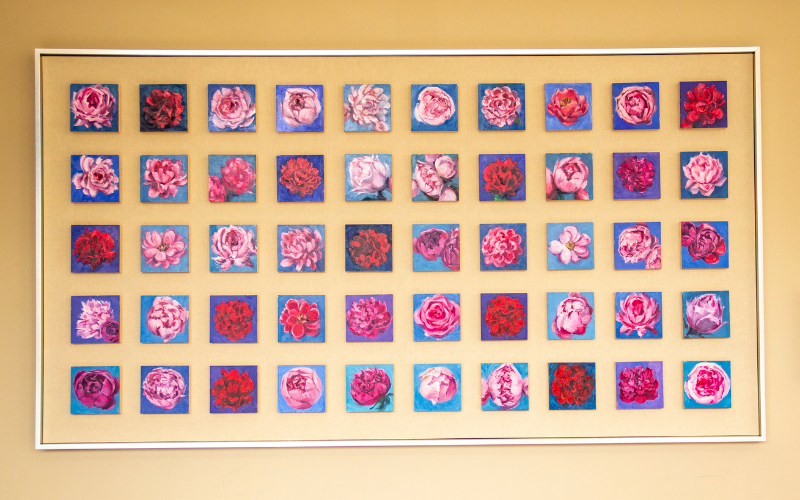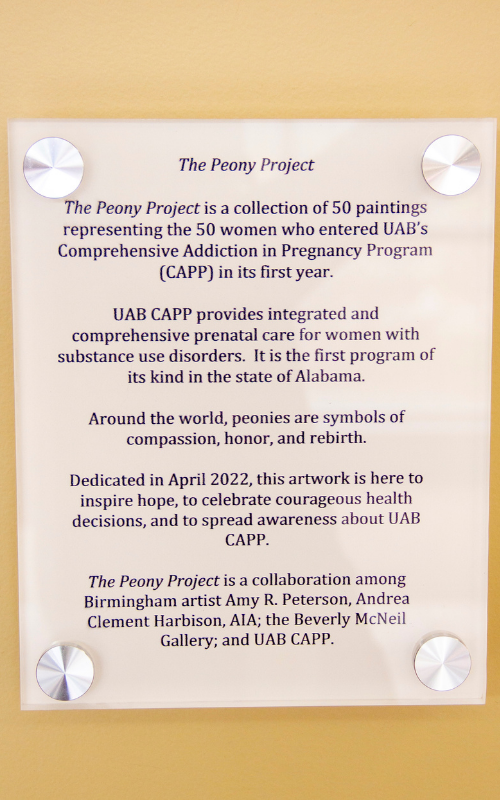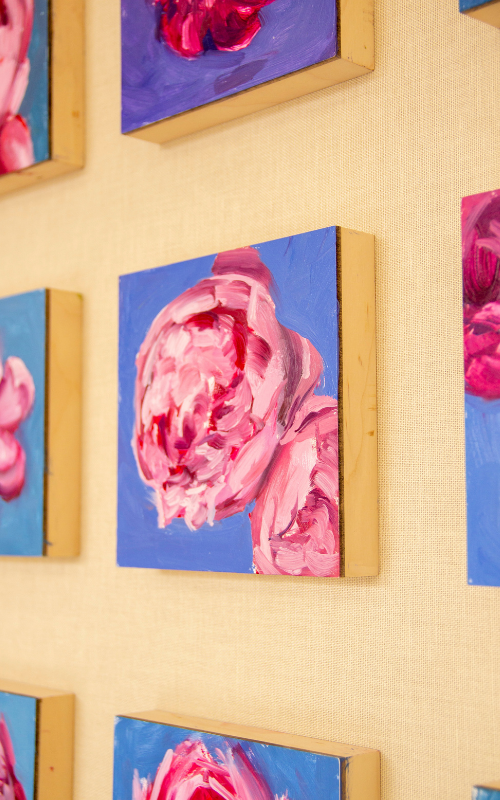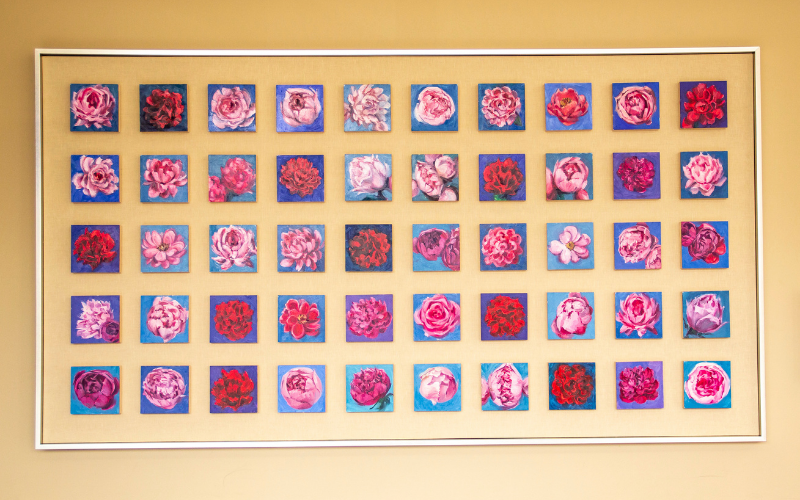
The most enduring art often honors bravery, especially when the subjects who inspired it beat the odds. The Peony Project is one such tribute, a collection of 50 unique flower paintings that represent the 50 Alabama moms who sought treatment during the first year of a unique UAB Medicine program that helps women overcome addiction during pregnancy.
The program is called the Comprehensive Addiction in Pregnancy Program (CAPP) and is part of the UAB Division of Maternal-Fetal Medicine. The Peony Project paintings spent May 2021 at a local art gallery, generating awareness and donations for CAPP. In April 2022 – the fourth anniversary of CAPP accepting its first patient – the paintings will arrive at their permanent home on the second floor of the UAB Women & Infants Center, where they will serve as symbols of hope and community for future participants.
The Importance of Peers

In Alabama, substance use disorders were a key factor in roughly half of all pregnancy-related deaths, according to the most recent maternal mortality review conducted by the Alabama Department of Public Health. The study recommended increased services and education for both new and expecting moms facing substance use disorders. CAPP was awarded grants from the UAB Health Services Foundation General Endowment Fund and the Children’s Bureau in 2017 to become Alabama’s first one-stop program for these resources.
Brian Casey, MD, director of the UAB Division of Maternal-Fetal Medicine and co-director of CAPP, says the peer community fostered by the program is the key to its success.
“CAPP’s group care and recovery model, integrated with routine prenatal care, serves as a potential game-changer for mothers and their unborn children,” Dr. Casey says. “They progress through pregnancy alongside a group of peers with similar struggles and continue to receive guidance and support after delivery.”
Shame and social stigma sometimes deter pregnant women from seeking help with substance use disorders.
“All of the women who come to us are courageous and resilient just for having taken this step,” says Suzanne Muir, associate director of the UAB Department of Psychiatry and Behavioral Neurobiology and co-director of CAPP. “There is no judgment in our program. We understand addiction as a disease, one that these women have a better chance of beating by joining together with others walking the same path.”
To date, over 200 Jefferson County women have enrolled in the program, and Muir says early participants have helped build momentum for CAPP. Both self-referrals and outside physician referrals have steadily increased, and similar services soon will be available in Walker County.
Dr. Casey says CAPP reduces the need for neonatal treatment for substance withdrawal and helps keep families together.
“Only 50% of babies born to program participants require treatment for neonatal withdrawal,” Dr. Casey says. “And while nearly 4 out of 5 of our moms report previous child welfare involvement, 4 out of 5 who successfully complete CAPP will have no DHR (Department of Human Resources) involvement within the six months following delivery or only have investigations that were closed after being deemed unnecessary.”
Artist Inspiration

Local artist Amy R. Peterson entered the picture by chance after receiving a commission from her friend Andrea Clement Harbison to paint one flower, which was to be given as a sign of hope and solidarity to a young woman who was considering enrolling in CAPP. As a mother herself and someone who’s lost friends to addiction, Peterson wanted to learn more about the program.
Peterson and Harbison envisioned a way to put art to work for a good cause. Instead of painting just the one flower, Peterson would paint 50 — one for each woman enrolled in the first year of CAPP. This collection could be used to raise awareness and funding. After researching the symbolism of various flowers, Peterson settled on the peony, a popular perennial that is recognized around the world as a symbol of compassion, honor, and rebirth. She approached CAPP leadership, and they gave their enthusiastic support to the Peony Project as a creative way to connect with both program participants and potential supporters.
The Peony Project made its public debut in May 2021 at the Beverly McNeil Gallery in the Lakeview District of downtown Birmingham, where it generated sponsorships for CAPP. Due to COVID-19, however, CAPP participants were not able to see the exhibit in person. That will change in April 2022, when the peonies find their permanent home at the UAB Women & Infants Center.
A Sense of Hope
The Peony Project is a collaborative effort by Peterson, Harbison, the Beverly McNeil Gallery, and CAPP co-directors Muir and Dr. Casey. Peterson says she has a personal connection to the project and high hopes for its continued success.
“I’ve talked to people personally affected by addiction in their families and close circle of friends,” Peterson says. “Some of them chose to sponsor a peony in honor of or in memory of those loved ones. All of our families and communities are affected by addiction. I have heard two comments over and over: First, people were impressed by this one-of-a-kind program in Alabama. Second, they wondered how they had never heard of it. Hopefully, having the Peony Project installed at the UAB Women & Infants Center leads to even greater community support and more people sharing knowledge of CAPP with pregnant women in need of these services.”
Community members can sponsor individual paintings, and donations help fund CAPP resources and necessities such as diapers, breast pumps, and car seats that are available for all program participants.
“We are hoping to make a visit to the peonies a regular part of CAPP orientation,” Muir says, “to give new enrollees a sense of hope and remind them that the women honored in each painting were in a similar situation and made it through.”

Click here to learn more about the UAB Comprehensive Addiction in Pregnancy Program, and click here to learn more about the Peony Project or to sponsor a painting.
